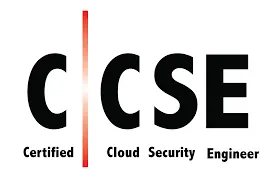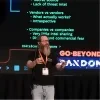Få nye IT-ferdigheter, bli sertifisert og løft IT-karrieren til nye høyder uten å sprenge banken!
Unlimited Taining – IT kurs og sertifiseringer gjort enkelt og utrolig billig. Få tilgang til 60+ Top LIVE-kurs for mindre enn prisen for ett kurs.











course: EC-Council Certified Cloud Security Engineer (CCSE)
Varighed: 5 days
Format: Virtual or Classroom


Oversikt
Legg ut på en reise til fortreffelighet i skysikkerhet med det sertifiserte kurset for EC-Council Certified Cloud Security Engineer (CCSE). Hev ferdighetene dine gjennom ekspertledet opplæring, og få den prestisjetunge CCSE-sertifiseringen. Dette omfattende programmet sikrer at du mestrer det viktigste, og gir et solid grunnlag innen sertifisert skysikkerhet. Hold deg i forkant i det utviklende feltet med CCSE-sertifisert opplæring, og form din vei til suksess.
 Instruktørledet opplæring
Instruktørledet opplæring Practice test
Practice test Selvstudiemateriell
Selvstudiemateriell Personlig læringsplan
Personlig læringsplan Sertifiseringsgaranti
Sertifiseringsgaranti E-mail, chat og telefonsupport
E-mail, chat og telefonsupport









Hvem er kurset rettet mot?
Sertifiseringen Certified Cloud Security Engineer (CCSE) er ment for de som jobber i cloud computing-miljøer og ønsker å validere sine kunnskaper og ferdigheter innen skysikkerhet. Den er designet for de som har erfaring med cloud computing og ønsker å utvide sin ekspertise innen skysikkerhet. CCSE-sertifiseringen dekker et bredt spekter av emner relatert til skysikkerhet, inkludert skyarkitektur og design, datasikkerhet, infrastruktursikkerhet, driftssikkerhet, juridiske og samsvarsproblemer, og hendelsesrespons. Ved å oppnå denne sertifiseringen kan du demonstrere deres ferdigheter i å sikre skymiljøer og implementere beste praksis for sikkerhet for å beskytte mot cybertrusler.
Kursinnhold
Forberedelse
Hos Readynez stiller vi med mange ressurser og har erfarne eksperter på området. Derfor lykkes vi også med mange fornøyde kunder. Du kan derfor trygt ta kurset ditt hos oss. For å ta CCSE-kurset kreves det imidlertid noen forkunnskaper.
Du har det perfekte utgangspunktet for å ta dette kurset med disse forutsetningene:
Møt noen av instruktørene du kan møte på kurset ditt. De er eksperter, lidenskapelig opptatt av yrket sitt og dedikert til å gi kunnskapen sin tilbake til industrien, yrket og de som ønsker å lære, utforske og fremme karrieren.

Kevin Henry er en globalt anerkjent ekspert som i over 20 år har bidratt til opplæring og sertifisering av mennesker innen IT-sikkerhet, inkludert CISSP, CISM, CISA og andre.
Kevin Henry is a well-known and highly respected expert instructor with Readynez.
Kevin has served for many years as an authorised instructor for (ISC)2 and he is renowned for his 20-year contribution to learners training for IT security skills- and certifications such as the CISSP, CSSLP, CISM, CISA and CCSP everywhere in the world.
Kevin is a force to be reckoned with, being an authorised instructor and training no less than 9.000 online learners monthly in the fields of information security and audit, in addition to the many students that attend his instructor-led courses with Readynez
He is also one of the most highly-rated instructors and most often he is given scores of 10/10 by his students with comments like these:
“Fantastic teaching and coaching”
Fredrik Palmquist Orange
“Most Excellent educator”
Jens Johanson Trafikverket

James Rowney er en velkjent ekspert med over 20 års bidrag til opplæring av IT-sikkerhetsferdigheter.
James has worked on many large mission critical environments in some of the largest companies in their industries.
Understanding business requirements and drivers are essential to any strategy and design. Understanding environments are key to any application or infrastructure changes, both the immediate services they interface with and those beyond. A failure to satisfy Non Functional Requirements can not be fixed by a process.
Specialties: CISSP, CCSP, AWS Solution Architect Associate, TOGAF 9 certified 86080 member of The Association of Enterprise Architects (AEA) - 27519830. BCS Solution & Enterprise Architect Certified - AMBCS - 990529878, Linux RHCE V5 expired, RHCVA Unix, Storage, SAN, Netbackup, Clusters, Design and Delivery of Infrastructure.

Friedhelm har mer enn 30 års erfaring innen IT, sikkerhet og personvern som senior informasjonssikkerhetskonsulent.
Friedhelm Düsterhöft is a Senior Information Security Consultant, Auditor, Trainer and Managing Director, and has 30+ years of work experience in IT, Information Security and Data Privacy.
He has contributed to various PECB whitepapers and articles, such as ’Information Security in Banks and Financial Institutions’, ‘What Does SIEM Stand For?’, ‘Why Organizations Fail to Pass an Audit’ and “How to Integrate ISO/IEC 27032 Cybersecurity with ISMS?’.
FAQ
The Certified Cloud Security Engineer (CCSE) er et sikkerhetssertifiseringsprogram for flere skyer laget av bransjeeksperter. Det gir en helhetlig forståelse av skysikkerhet og gir cybersikkerhetsfagfolk i stand til å bruke praktiske ferdigheter i arbeidet sitt.
Bli med Readynez for fremtidens skysikkerhet ved å melde deg på vår Certified Cloud Security Engineer (CCSE)-opplæring. Våre ekspertinstruktører spesialiserer seg på eksamenssuksess, og veileder deg gjennom et omfattende kurs for beredskap i det utviklende skysikkerhetslandskapet. Sikre en givende fremtid med Readynez sine fokuserte opplærings- og sertifiseringsprogrammer innen skysikkerhet.
Sertifiseringen av Certified Cloud Security Engineer (CCSE) har ingen strenge forutsetninger eller noen påkrevd kvalifikasjon i form av spesifikke utdannings- eller faglige krav. Imidlertid anbefaler EC-Council, organisasjonen som tilbyr CCSE-sertifiseringen, å ha en sterk forståelse av nettverksteknologier og informasjonssikkerhetskonsepter.
Eksamensavgiften er 85€. Hvis du ikke består eksamen, vil du få et nytt forsøk på å ta en eksamen som er gratis bare hvis du gjør den i samme eksamenssenter.
CCSE-sertifiseringen er verdt å satse på for en karriere innen skysikkerhet, som validerer ekspertise innen utforming og sikring av skymiljøer. Den er anerkjent i bransjen og øker troverdigheten og åpner dører til avanserte roller. Vurder at det samsvarer med karrieremålene dine og etterspørselen etter fagfolk innen skysikkerhet i din bransje.
Tiden det tar å bli en Certified Cloud Security Engineer (CCSE) varierer basert på faktorer som tidligere erfaring, eksisterende kunnskap og studievaner. I gjennomsnitt kan kandidater bruke flere uker til noen måneder på å forberede seg til CCSE-eksamenen.
Ja, du kan ta eksamenen Certified Cloud Security Engineer (CCSE) online. Eksamenen tilbys av Cloud Security Alliance (CSA) og er designet for skysikkerhetsingeniører som er ansvarlige for å designe, implementere og administrere skysikkerhetsløsninger.
Vanskeligheten med å beståSertifisert skysikkerhetsingeniør (CCSE) eksamen kan avhenge av din bakgrunn, erfaring og forberedelse. CCSE-sertifiseringen tilbys av EC-Council og er en bransjeanerkjent legitimasjon som validerer en persons ekspertise i å administrere og sikre skymiljøer.
Basert på EC-Councils eksamenspraksis, er bestått poengsum satt til mellom 60 % og 78 % avhengig av eksamens vurderingsstandard.
Anmeldelser

Readynez er den beste treningsleverandøren jeg har brukt på mange år. Kundeservicen deres er førsteklasses, prisene er veldig konkurransedyktige og instruktørene er utmerket.

Lett å delta over Teams og en utmerket instruktør ga meg stor verdi for tiden jeg investerte.
Hvorfor Betale Mer?
Hvorfor nøye seg med bare ett sertifiseringskurs når du kan delta på ALLE sertifiseringskurs til en pris som er lavere enn prisen på ett kurs?

Den perfekte måten for oss å utvikle ferdighetene vi trenger for å lykkes
![]() Kasper Meyer Christensen
Kasper Meyer Christensen
Bedrifter som bruker Unlimited Training sparer minst 50 % på opplæring og sertifiseringer – og mange opptil 80 %
Personer med en Unlimited Training lisens gjennomfører i gjennomsnitt 2,4 kurs per år

For en pris som er mindre enn prisen for ett kurs.

Bare billigere og mer fleksibel.

Den enkleste, mest fleksible og billigste måten å bli sertifisert på.

Delta på så mange kurs du vil – ingen begrensninger!

Vi refunderer hvis kostnaden for lisensen overstiger verdien av treningen din.

1-til-1 med 50+ erfarne instruktører

